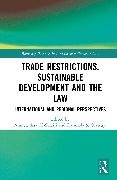Read more
This book examines the legal ramifications and impact of trade restrictions on sustainable development. It evaluates the role of international and regional dispute resolution mechanisms in promoting timely resolutions to minimize adverse sustainable development impacts.
Analysing the gaps and challenges faced by trade and dispute resolution institutions, the book focuses on the role of the WTO in advancing trade multilateralism and dispute resolution in times of trade restrictions. It discusses the legal and diplomatic strategies through which blockaded States can minimize trade and economic disruptions in a manner that advances sustainable development. Using the State of Qatar as a case study, the book examines how countries impacted by trade restrictions can balance competing interests of recalibrating international trade and promoting sustainable development goals. It also covers how blockaded States can fulfil their obligations under a wide range of multilateral treaties. Additionally, the book provides suggestions for sustainable reforms needed to build effective, neutral, and resilient dispute resolution systems at national, regional, and international levels. It presents practical recommendations on policy frameworks to enhance trade resilience in countries under economic blockade and restrictions.
The book will be an essential resource for academics and researchers in the fields of trade, investment, dispute resolution, sustainable development, international law and diplomatic studies.
List of contents
Part I: Introductory Context and Principles1. Trade Restrictions and the Sustainable Development Nexus
2. Trade Restrictions and National Security Exceptions
3. The Role of Regional Institutions in Times of Trade Restrictions
4. Trade Restrictions and the WTO Dispute Settlement System
Part II: Advancing Sustainable Development in Times of Trade Restrictions: The Qatar Case Study5. Protecting Trade and National Interests through Strategic Dispute Resolution: An Evaluation of Qatar's Legal Response to the Blockade
6. Building Economic Resilience to Trade Restrictions Through Trade-Related Measures
7. Trade Restrictions and Regional Integration: Legal and Institutional Imperatives During and Post-Blockade
Part III: Lessons Learned and Future Directions8. Towards Greater Effectiveness and Neutrality of Regional Dispute Mechanisms: Perspectives from the GCC's Regional Trade Dispute Settlement Mechanism
9. Conclusion: Advancing International Trade Law Objectives in Times of Restrictions: Summary for Policymakers.
About the author
Ahmed Essa Al-Sulaiti is currently working as a Lecturer at Hamad Bin Khalifa University, College of Law, and a lawyer before the Appellate Court in Qatar. Previously, he served as Director of the Office of the State of Qatar to the World Trade Organization and other economic organizations. He represented Qatar at the World Trade Organization (WTO), the United Nations Conference on Trade and Development, and the World Intellectual Property Organization (WIPO). He is a graduate of the University of Tampa (Bachelor's in International Business and Management) and of Hamad Bin Khalifa University, College of Law (Juris Doctor), a program offered in partnership with Northwestern University.
Damilola S. Olawuyi is Professor of Law and UNESCO Chair on Environmental Law and Sustainable Development at HBKU Law School, at the Hamad Bin Khalifa University, Qatar and a Chancellor's Fellow and Director at the Institute for Oil, Gas, Energy, Environment and Sustainable Development, at the Afe Babalola University, Nigeria.

